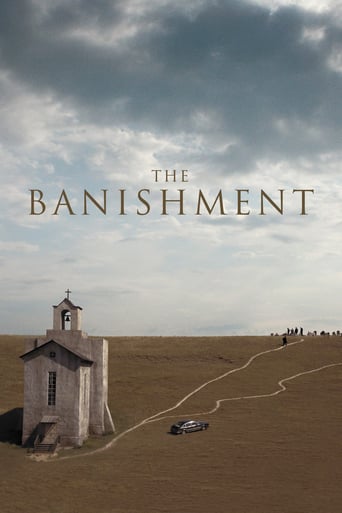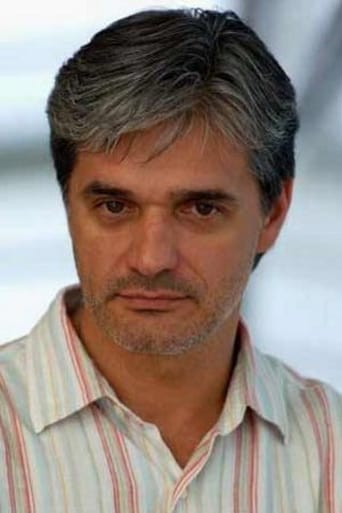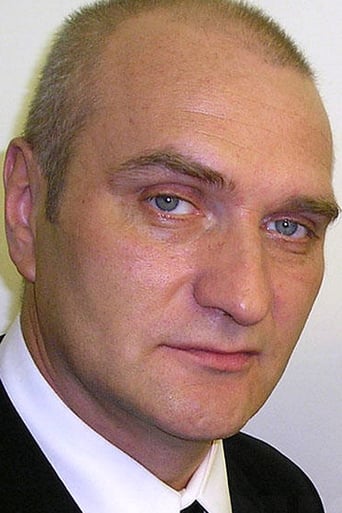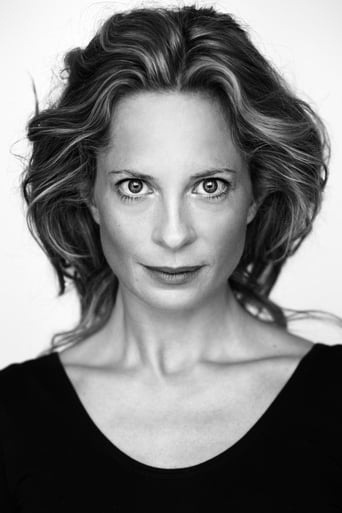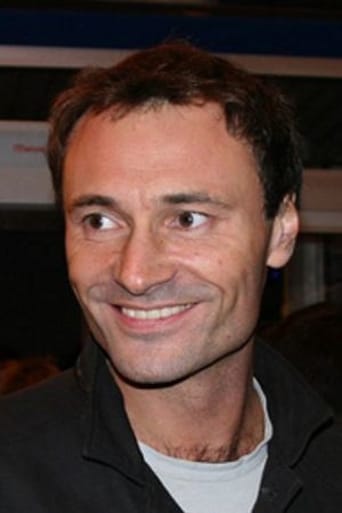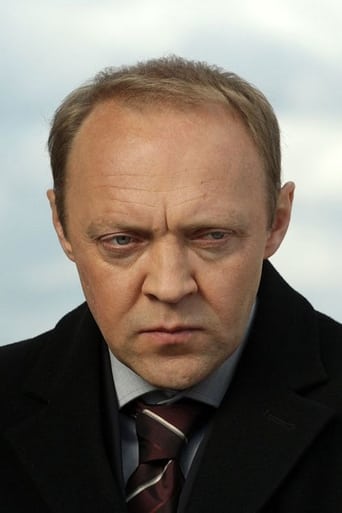Peereddi
I was totally surprised at how great this film.You could feel your paranoia rise as the film went on and as you gradually learned the details of the real situation.
Fairaher
The film makes a home in your brain and the only cure is to see it again.
Salubfoto
It's an amazing and heartbreaking story.
Arianna Moses
Let me be very fair here, this is not the best movie in my opinion. But, this movie is fun, it has purpose and is very enjoyable to watch.
robert-642
I watched this film on the basis of having enjoyed The Return. How wrong can one be. It would be generous to say that it makes the films of Bruno Dumont seem like action films! You can tell when a film is a deceit by the opening shots. Long takes of roads and trees are nothing but a waste of film and the viewers time. A walnut tree does not a film make. Creating atmosphere is one thing but suffocating the viewer is another. And so the rest of the film goes on in the same way: ennui seems more debilitating than euthanasia and that is what this film engenders.Tell me: how many children have you seen who, going to a new home, albeit dilapidated, show no excitement? Are we saying that Russian children don't run around exploring every nook and cranny with yelps of delight? And so having flicked through chapter after chapter to see if their was any movement - a rabbit skipping across the grass would have been fine - I decided to call it a day and put on a DVD of Tom & Jerry.Good films I enjoy. Pretension I detest.Zero
johnnyboyz
Andrei Zvyagintsev's gripping drama The Banishment plays out like Eastern Promises meets Carlos Reygadas' 2007 feature Silent Light; a combination of rather embittered Russian criminals operating and uncovering certain revelations around innocents whom later become caught up in the crossfire, with this weighty, steady visual aesthetic of rural land captured by way of long takes and eerie, heavenly music juxtaposing the on screen non-paradise we witness. Zvyagintsev's film is a minor-masterpiece, a film combining the essence of each of the above films with various cues from that of something like Coppola's Godfather films; the studious deconstruction of a family unit, not all of them necessarily criminally minded, slowly; painfully; deathfully falling apart at the seams as those of varying genders, ages and backgrounds fall away from one another because of a troupé of men's actions. It is a rigorously immersive film, a fine effort from a man firing on mostly all the cylinders he decides to shoot from; the end product formulating into a morbidly fascinating procession of drama and character.The film will begin with a car being driven by a wounded man through rural fields split by the tarmac road his car occupies, the trees and birdsong unpleasantly disturbed by the roar of the car as it hares by. After another instance of countryside peace being disturbed, an unperturbed cut will see the car enter a more urbanised locale full of bricked up walls and factory chimneys churning out reams of smoke. The driver is a certain Mark (Baluev), a criminally orientated brother to that of Alex (Lavronenko) who lives in the city; the charging of his car past the calm, peaceful rural world during the opening shots a precursor to the sorts of later shattering of the tranquillity he and the family with whom he shares ties to. The aforementioned jolting cut between peace and countryside to city life additionally highlights a sudden change in surroundings, an example of shifting surroundings for the worse which will additionally go on to encapsulate the framework of the film and the general well-being of a family congregation. Mark is injured, but trusty brother Alex patches him up in the dead of night - his dealing with a bloody, scuzzy; grotty situation highlighting skill of a physical nature in his ability to deal with such a scenario of such a delicate, precise nature; before the film places him into a similar predicament, only of immense psychological and spiritual sorts.With Alex lives his wife Vera (Bonnevie), whom puts up with people of Mark's ilk arriving at her home whilst she sleeps at ungodly hours; when Alex goes to lie next to her, the film providing us with the first of many eerie shots that peer straight down at the couple lying in bed facing upwards at us: very little in the way of contact nor communication and grossly varying positions as they lie situated there, as if not of a similar ilk. Following on from the opening, Alex; Vera and their son Kir with their daughter Eva journey by way of localised train network and by foot through the forests and fields to a farm house. The journey by train is, again, muted; the unit of four sharing varying poses and stances as they sit in the train's compartment avoiding eye contact; the insinuation is disenchantment or a unit not hooked up to one another.The house they arrive at is one Alex appears highly attuned to, later reveals are that he spent time there as a boy with brother Mark; the faces of elderly and long since deceased family members peering through the exterior glass window of their photographic frames as their image hang there, looming over proceedings as they watch on from the walls. The house, of which is seemingly only accessible from the front by way of a narrow wooden bridge over a kind of moat thus inflecting it being cut off from a distinct 'other side', is a peaceful haven set isolated from civilisation amidst the scorched fields and constant sun. The family are not infallible, uncomfortable scenes such as the one that sees Vera argue with her young daughter unravel, whilst the visiting to Alex's family by neighbouring relative Viktor (Sergeev) and his family demonstrate a seemingly perfect, working unit of this nature in full flow as the distinction between his and Alex's appear even greater.The bombshell which ruptures this existing arrives in the form of the announcement of Vera's pregnancy, a pregnancy which Alex is informed wasn't instigated by him. What follows is a slow burning sensation of dread and affliction, perpetrated out of human nature's ill-advised methods in dealing with such situations; a late night seeing off of Vikto and co. whom were visiting seeing Alex occupy a part of the porch to the left side of the screen as a distinct wooden foreground beam splits the frame down the middle, distinctly placing Vera on the other side; the film seeing it now necessary to place a physical object so as to highlight the 'split' from one another the two characters share. Zvyagintsev's film is a fine effort, instilled with an agonising and morbidly captivating air about it as we witness these people and their lives disintegrate out of a man too of-his-ilk to be making decisions whilst influencing another man whom ought to be strong enough to see sense. The contemporary cinematic antithesis to Bekmambetov's Americanised Night Watch, or indeed Bondarchuk's Hollywood war movie simulacrum 9th Company, The Banishment banishes most doubts over the Russian cinema industry's strengths and motifs.
Eternality
Giants of Russian cinema included Sergei Eisenstein (The Battleship Potemkin, Alexander Nevsky), Andrei Tarkovsky (Ivan's Childhood, Solaris) and the emerging Aleksandr Sokurov (Russian Ark, Father And Son). All three are recognized as the leading Russian filmmaker of their generations, consistently producing works of immense quality and value. The director of The Banishment, Andrei Zvyagintsev, is one of a few who shows potential to be another great voice of Russian cinema. His previous effort, The Return, was a soporific excursion into the Russian wilderness; though cinematographically stunning, it fails in its ability to completely engage the viewers.The Banishment shares the same characteristics. The difference is that it is a whole lot longer, running at nearly a-hundred-and-sixty minutes. The story could have been wrapped up in a taut ninety-minute drama but Zvyagintsev chose the more abstract route to film the picture. Only time would tell whether his choice was sound. At its heart, The Banishment has a pitiful story to tell. However, it is told at such a snail-like pace that it appears almost lackluster and feels like it is not making any storytelling progression especially during the final two-thirds of the film.The character developments of the three main characters are palatable enough to pull viewers through the lengthy film. Each one of them struggles with problems of high emotional intensity, often as a result of miscommunication, selfishness, and jealousy. Zvyagintsev opts to use long static shots of these characters' faces to capture their inner feelings and juxtaposing it with the unpredictability of the Russian wilderness. One top-notch sequence involves a five-minute reverse tracking shot of water flowing downhill into small streams and eventually into a big puddle that shows a reflection of something that is of immense significance. Its monotony is ultimately broken by the onset of rain.The Banishment while sporadically exhibiting glimpses of promise unfortunately feels too long-winded. It is a commendable piece of cinema and has the potential to become a great character study if Zvyagintsev decides to do a director's cut with a trimmer runtime. The Banishment is made for the art house crowd and yes, for one with a hell lot of patience.SCORE: 7/10 (www.filmnomenon.blogspot.com) All rights reserved!
Film_critic_Lalit_Rao
Those who have seen Russian director Andrei Zvyagintsev's first film "The Return" will have no trouble in realizing that his second film "Izgnanie" /"The Banishment" is equally impressive.However,his second film is little less effective despite having many themes in common with his first film.It can be surmised that it was due to intriguing focus on adults instead of children.This is exactly the reason why many a times viewers might get the impression that children are used merely as unavailing props.Astute viewers will also notice that many references to Tarkovsky are quite natural and self explanatory as Andrei Zvyagintsev is an honorable heir of that famous Russian school of cinema which prides itself in observing minute things in greater detail.It is true that a film maker must not give all answers to viewers but highhandedness of Andrei Zvyagintsev's direction failed to engage viewers.This is one reason why so many essential questions remained unanswered throughout the film.But this would surely not deprive any sagacious viewers to enjoy this extremely meaningful film with excellent focus on art direction especially in the manner interiors have been created.
